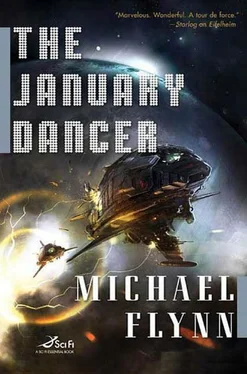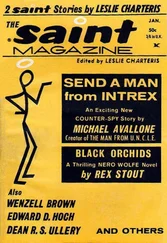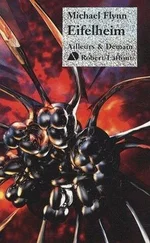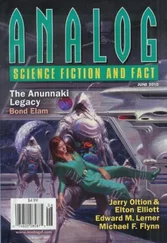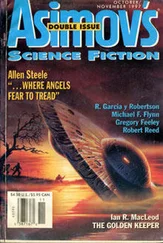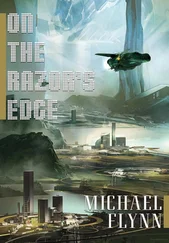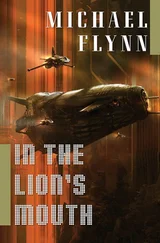A happier time, the stories said; a time before the Great Cleansing. Now the Confederacy of Central Worlds—tightly ruled, patiently waiting, watching the Periphery with hungry eyes—squats upon that distant shore across the gap of stars.
Thankfully few roads cross the Rift, for the electric currents that crease space into superluminal folds depend on the plasmas of roaring suns, and there are no suns in the Rift. Those that do cross are as tenuous as rope suspension bridges across a gaping canyon, their end points snubbed to stubborn blue giants. The crossing points have been carefully mapped by the fleets of High Tara, the Greater Hanse, and the Hatchley Commonwealth. Their survey ships have pricked each on their charts and noted the speed of space—the local-c—and other such qualities of space-time; and by each such crossing they have positioned a squadron of cruisers and swift-boats. These check the bona fides of the trade ships that venture out and of those that venture in; and await the day when Confederate corsairs pour across the Rift in a wave of conquest. Then they will die—for what is a squadron against a fleet?—but the swift-boats will stream out and spread posthumous warnings to all the nearby suns.
The High Taran squadron commanded by the Cu na Fir Li guards the crossing known as St. Gothard’s Pass. This current curls in from a frontier province of the Confederacy and, on the Peripheral side of the Rift, entangles a blue giant called the Sapphire Point Interchange. From there, short Newtonian crawls reach the Palisades Parkway, which skirts the edge of the Rift toward the Old Planets, and the Silk Road, which winds its way around two dozen stars before reaching the great interchange at Jehovah, whence to Gladiola, and Ugly Man; to New Chennai and Hawthorn Rose; to Alabaster, and far Gatmander. A third current flies off from Sapphire Point to the Galactic East, whose worlds are as yet unsettled and unexplored.
It was, in the reckoning of Fir Li, the obvious invasion point. No other crossing offered such ready access to so extensive a volume of the ULP. He had said so, and often, to the Ardry of High Tara, Tully King O’Connor, until, tiring of this Jeremiah in his court, the King had ordered Fir Li to take personal command at Sapphire Point.
So Fir Li had taken his “Pups” and his personal ships, and heighed off to stand the watch. Yet, where his enemies at court saw defeat and exile, Fir Li tallied a triumph. He was a Hound, and Hounds usually get what they want. Since then, captains and men and ships had come, and served their rotations, and gone, but the Hound of Fir Li stayed on—an exile from the court, or a sentry on the wall, depending on one’s point of view.
Over time, some courtiers had whispered, the sight of the Rift, of such an emptiness in the midst of light, could break a man, and drive him mad.
A Hound of the Ardry could be many things and any thing. Loyal for a certainty. Relentless on the scent. The High King had no more loyal servants than the Hounds. They were resourceful; skilled in all manner of arts, both politic and martial; without pity or remorse when what had to be done had to be done. They could use words the way the Meathmen of New Eireann used claymores—often with the same decapitating results—but they were no strangers to other weapons. A single Hound, dropped at dusk into the Vale of New Eireann, could have stopped the civil war in a night and a day.
Na Fir Li, in his youth, had not been the least of this company. He had overthrown the Fourth Tyrant of Gladiola with a few well-placed rumors dropped in the bars of Florentz City. He had for five years managed the planet of Valency, where his name is yet revered, ending their awful Interregnum. He had directed the reconstruction on Ugly Man after the earthquakes there. He had assassinated fifteen men and women who had deserved death; and rescued twenty-seven who had not. He had even crossed the Rift, to walk the fabled streets of the Secret City on Dao Chetty, where none but Those of Name may tread.
Messenger, spy, ambassador, saboteur, assassin, planetary manager—a Hound could be whatever the Grand Seanaid desired when the Ardry spoke “with office” in the name of the ULP, for no one loved the ULP more than the Hounds of “The Particular Service.” It might fairly be said that the League existed as something more than a theory only in the convictions of the Hounds; and if ever there was anything that could drive a man mad, it was not the Sapphire Point Station, but devotion to a thing that was not quite real.
But there is something enervating about a duty in which for the most part nothing happens and where success can be measured by nothing continuing to happen. It was a period of détente, and the border was supposed to be open, so there was a steady, if slow, volume in trade, and this made for an occasional customs inspection, but not often enough or varied enough to counteract the ennui of the long watch. Routine dulls the wits; so the Hound of Fir Li called random security drills and mounted exercises, neither too few to ensure readiness, nor so many as to dull it. It was a fine tuning, like stretching the strings on a harp, seeking the proper pitch without snapping the chords.
And so most time was spent in relaxation—in sports, in games of skill and chance, in debate, in reading and writing and painting and the creation of music. In romance and in quarrel. In all those things with which, since the Caves of Lascaux, human beings had decked their lives. It fell to Greystroke, Fir Li’s deputy, to manage these things, to arrange the concerts and the bounceball leagues and suchlike—and also to apply discipline when the music became too loud, the debate too physical, or the games of chance too certain; to adjudicate all those frictions that develop when those who have been trained to act on a moment’s notice must wait for that moment not to come. Greystroke was journeyman enough to chafe at such mundane duties.
Fir Li’s flagship, Hot Gates, was a faerie castle set loose in space. Never intended to enter an atmosphere, it lacked even a pretense of streamlining, and might have seemed more a small village to the ancients than what they had imagined a spaceship to be. It was Greek and Gothic and Tudor and Thai, and Fir Li, who had never heard of any of those folk, had managed to incorporate all the most monstrous aspects of each. Hot Gates was a chimera, odd even by the standards of its kind—blocks and spheres and tubes and causeways were all a-jumble, protected within a spherical field and given a whimsical variety of ups and downs by an idiosyncratic use of gravity grids. The faeries had been mad. It would have seemed out of place anywhere—save here on the ragged edge of space.
Fir Li himself had chosen midnight for his skin and moonlight for his hair. He was blacker than the gap he guarded, and in his dim-lit rooms, the white cascade of his mane could be the only visible sign of his presence. When he moved, it was swiftly and silently. Bridget ban, a colleague, had once compared him to a panther; others had compared him to the Rift itself.
He sat in a light-framed swivel chair in the center of an otherwise empty sitting room, one wall of which was an image screen kept tuned to the Rift. He can see the Point, some in the Squadron whispered. He got these funny eyes and he can see deep down into the currents. When the ’Feds come, he’ll spot them afore our sensors do. It wasn’t true, or maybe it wasn’t true; but the Rift drew him, possessed him; and the sight of it had impressed itself upon him like a signet impresses the wax, and a bit of its emptiness had invaded his soul.
Perhaps that was why he kept his sitting room dark at most times. The chair he occupied was an octopus, whose flexible arms caressed the Hound with controls and inputs and outputs. Using them, he could hear what the ship heard, see what the ship saw, speak with the ship’s voice—but he had muffled all but two for the moment. On one, he scrolled through a novel by the great Die Bold writer Ngozi dan Witkin, who had lived in the early days of the Great Cleansing and had written most poignantly of the loss and confusion of those first generations. But because Fir Li was paraperceptic, a second reader displayed statistics for traffic through the Rift. This did not divide his attention, for each called upon different faculties of his intellect. A third faculty, the one that touched on icon and myth and image, contemplated the great rift displayed upon his wall.
Читать дальше
